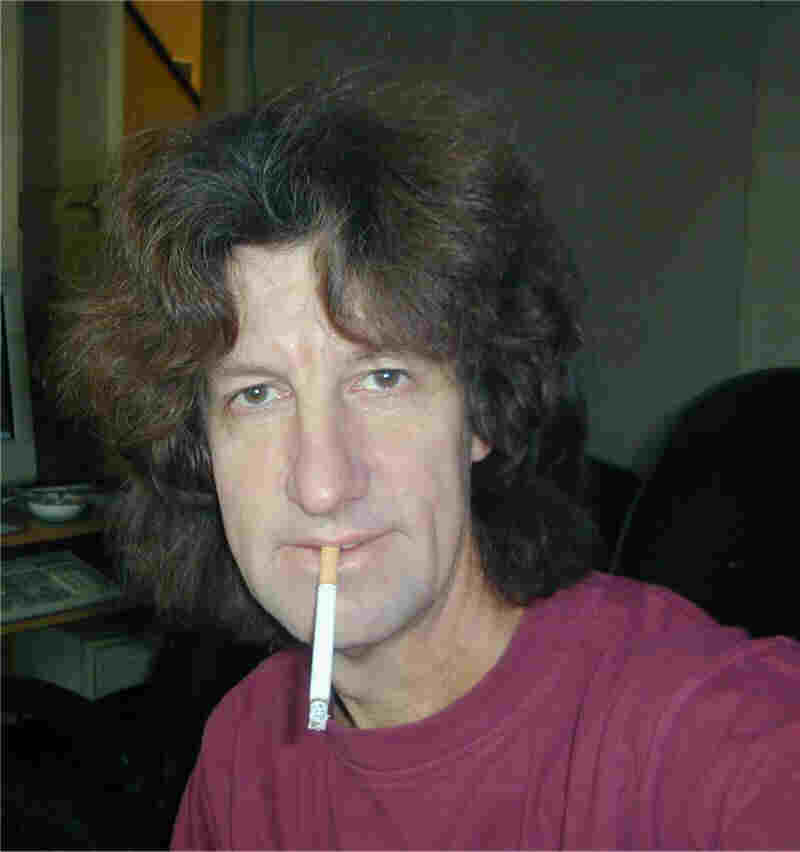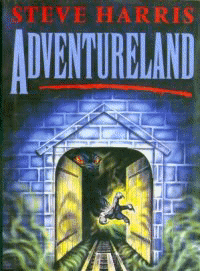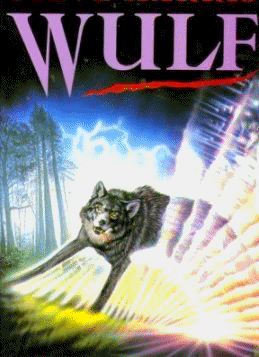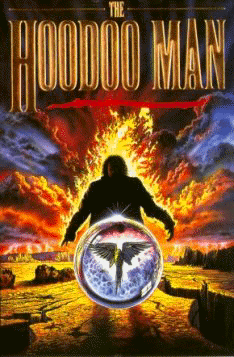
Steve Harris is one of Britain's leading-edge writers of horror fiction (with best-selling titles like Wulf and The Hoodoo Man under his belt). Here Shadow Writer proudly presents Paul Kane's exclusive interview with the man himself...
Paul Kane: Did you always know you were going to become a writer or was this something that crept up on you?
Steve Harris: I learned to read early (my Mum taught me whilst watching Playhour on her knee). I always loved reading and did the whole Richmal Crompton and Jennings and Darbyshire stuff when I was a kid. English was my best subject in skule, but I never had any thought of being a writer. I started reading horror when I was about 9 or 10 - The Pan Book of Horror etc., and loved it, and read a lot of SF too, but I never thought about being a writer. Ever. Honest. My school compositions were hard work. I wanted to be a rock star. I played bass in a number of bands. When all this finished and I found I had time on my hands. I read a lousy horror novel by a British author and thought, fuck, I could do better than this rubbish. And the idea was born. But could I write? I didn't know...

Paul Kane: You had a number of jobs before becoming a writer, can you tell us any stories about any of them - and have you used your experiences from these in your writing work?
Steve Harris: Well, the best story is the ammunition depot one. I once worked at Bramley C.A.D. (Central Ammunition Depot). I was mostly employed in 'repair' building on a production-line basis. This was dull work and consisted mainly of changing the 'exploders' that make 105mm Howitzer shells go bang when they hit your home or car. A railway truck full of boxes of two shells rolled up at one door, and were unloaded on to a U shaped roller-line that ran back to empty truck. First stop they were unpacked and stood on a dolly, next stop someone took them to a compressed air driven machine that removed the fuses (the pointy bits at the sharp end - the exploders live underneath the fuses). Then someone else changed the exploders (or fuses, or both) and screwed 'em all up again. Then they were packed up and put in the waiting truck. These shells are heavy. They're made of thick steel and stuffed full of RDX/TNT. When you've been lugging them from the line to the machine, standing them on end, doing the biz and carrying them back again all day, you tend to get tired.
On this particular day, a girl called Carol was doing the fuse removal. Carol wasn't having such a good day. Boyfriend trouble, probably. It usually was. Imagine a big brick-built building with perhaps 40 of these shells on a service line in various stages of undress, 16 or so people working on them. Imagine two railway trucks at either end of the line, both stacked to the roof with more boxes of two of these things. Now you've done that you'll realise why they placed these buildings a good long way away from each other: if one goes up it won't set off all the others.
I was walking across the workshop floor on my way to the washroom when it happened. About ten feet behind me, Carol gasped. I spun round, saw her frantically trying to catch hold of the shell she'd just picked up...and dropped. The following moments, I swear, happened in genuine slow-motion. I watched Carol flail at the falling metalwork, watched as the shell smoothly tipped itself through ninety degrees or more so that its pointed fuse was going to come into contact with the ground first. I knew this: each fuse was safe. Built into every one were safety devices; the fuse could not be armed without having been fired from a gun barrel. The centrifugal motion, armed one section, the sudden forward thrust another.
Even though the shell was going to hit the ground on its tip, it couldn't possibly set off the exploder, which would detonate the shell - and in turn, probably all the other shells in the vicinity. I also knew that these fuses had a six second delay: once they'd impacted your house or car, they wouldn't detonate for a little while: presumably so you could go, 'Hah! it didn't go off!' before you died. In slo-mo I glanced across the building at all the other pale faces, frozen in horror as they watched the shell fall. The shell hit the floor perfectly. A sound like a small pop was heard in the silence. Then something fizzed and smoke began to pour from the fuse. 'You have six seconds left to live,' I thought and unlike everyone else who was still frozen, I ran for it. Exceedingly quickly.
In those six seconds, which I counted as I fled, I got outside the building and a good way down the road. Not far enough though, I knew. As I reached zero, still pelting along, I waited for the blast to lift me off my feet; waited for tons of debris to tear me apart. I didn't stop running until I reached the safety-zone - the next building along - where I turned back to look, still ready to run some more if necessary. There was no explosion. I waited. About five minutes later, ashen-faced staff filed out of the building, many of them crying (not surprising really!). Five minutes after that, the bomb-disposal guys went in. They were gone two hours. They came out smiling. 'Perfectly safe,' the major said. 'Wasn't anything to worry about at all. Only four of the five safeties blew so it couldn't go off.' These were the safeties that couldn't blow unless the shell was fired from a gun. I thought it was about time I looked for a new job...
Paul Kane: Well, writing's a lot safer...Usually. But your path to becoming an author wasn't an easy one. Did you ever feel like giving up at times, and what spurred you to go on?
Steve Harris: Grim determination. I thought I could write. And I was going to bloody well prove it to those who doubted me. And besides, by the third unpublished manuscript I thought I was getting a handle on what writing was all about. And some of those rejection letters actually praised me along the lines of 'close, but no cigar'. I was now feeling as if I really could write. And like I say to everyone who wants to be a writer 'never stop!'. Soon as you stop you might as well never have started. All that wasted work. I couldn't bear the thought of it!
Paul Kane: So what was your first big break in writing?
Steve Harris: Having a publisher I'd forgotten I'd even sent a manuscript to several months eariler phone me up and say he wanted to make me an offer. Prior to that I didn't have any breaks at all, of any kind. Mysteriously, a little while after I'd accepted the deal (with Headline), Fear magazine accepted a short story I'd written.
Paul Kane: Hmmm. Very mysterious... Your first novel, AdventureLand, revolves around a funfair. What is it that makes these so creepy do you think, and was the novel based on any childhood fears of such places?

Steve Harris: It's the ephemerality of them, I think. One day you have what looks like a small patch of grass, the next day it's been transformed into something that's surely much larger and which has its own paths. It's like an instant small town full of strangeness and noise and lights. And then it's gone again and all that's left is brown patches of grass in the shape of the bases of the rides and stalls and it all looks like it couldn't have been as huge as it seemed when you were walking round. The town has gone again. And the folks who run funfairs aren't like you and me. There's something strange and different about them (ask the guy who wrote Taken!). They look dangerous. And there are always stories passed around about what they're like and the bad things they do. You start to think, well they must have got this reputation somehow. I'm sure they're all lovely people in reality! Childhood fears? Nah, I used to love the annual carnival and funfair when I was a kid. But kids have been known to vanish at funfairs...
Paul Kane: Wulf seemed to pre-empt the whole BSE panic in the 90s, although your prediction was much worse than the reality, thank goodness. Do you keep a track of the news and look out for stories that might make good horror themes?

Steve Harris: Yes, I listen to Radio 4. They're excellent at getting early snippets of news that won't yet make the telly and no one else is going to hear about for ages. I watch a lot of documentaries on telly and keep my ear to the ground. Sometimes useful stuff comes your way if you do that. And if, like me, you're a raving paranoiac... In the beginning cows got scrapie - a disease exclusive to sheep. A disease which couldn't cross species. And why? Cos they fed dead sheep bits to cows (which are herbivores). That's what got me rolling. In Wulf I wasn't predicting what would happen, but extrapolating to the nth degree. Being God of your own little bit of creation goes to your head!
Paul Kane: That novel is also an apocalyptic tale. Are there any writers who influenced you with regard to this, I'm thinking of maybe Wyndham or Matheson?
Steve Harris: No, I don't think either of them had anything to do with it. I just wanted to look at fairly large scale destruction and the folks who caused it. If it was influenced by anything, it'd probably be the Hungerford massacre when Michael Ryan ran round shooting folks. Cut off a village, keep the cops out, and let the bad guys run around...
Paul Kane: Which other writers do you rate, both classic and contemporary, and have these had any influence on you as well? (I know, for instance, you're a fan of Stephen King and PK Dick).
Steve Harris: Oh, I'm a fan of many writers. Peter Straub, Garrison Keillor, Donald E Westlake/Richard Stark, Richmal Crompton, JK Rowling, Stephen Donaldson, Heinlein, le Carre. I could go on naming authors whose books have influenced me in one way or another for ages. There's always something to be had from everyone you read. A new way of putting something, a new plot device. Everything I read has some kind of influence.
Paul Kane: The other side of this is whose work are you not fond of?
Steve Harris: I couldn't possibly say! I'll only get myself into more trouble!
Paul Kane: Ah, go on... Only joking. Right, next question: The Hoodoo Man is possibly one of your most popular books - in fact your website is named after it. Do you believe in psychic abilities yourself, and how much research into the subject did you do before writing it?

Steve Harris: My website is named after The Hoodoo Man cos I was writing it around the time I put up the website. My internal jury is still out on the matter of psychic abilities. I've had telepathic moments in my time, that's for sure. But the big stuff...I dunno. There's something, I'm sure, but I'm not quite sure how much of it there is or how big it is. The Hoodoo Man is about free will vs predetermination. You'll note that Danny Stafford signally fails to avert the future he dreads! I've always been interested in psychic stuff and have done plenty of reading over the years, so I didn't really have to do any hard research for the book. And I'm also very interested in the workings (and failings) of the human brain and mind, which gives you plenty of material to work with!
Paul Kane: What kind of horror do you prefer to write, the 'in-your-face hard-hitting' sort or the more subtle, 'what's around the corner' variety?
Steve Harris: I'm not sure I've ever done anything particularly subtle. I prefer good characterisation and plenty of action.
Paul Kane: You're a bit of a globe-trotter, Steve. Has this helped when it comes to settings and locations in your books?
Steve Harris: Probably not since I've set two books in or near my home town! But I do love to travel and any excuse to do it is welcome. When I wrote Angels, I drove to Greece and back and used the route and places for the story. Straker's Island was set in Florida (after I'd travelled round Florida) and Miami Five Fifteen (as yet unpublished) is set across the UK and the US. Like reading, all travel gives you stock for future use.
Paul Kane: Okay, now here's a bit of a controversial one...what do you make of the horror scene these days, with big publishers being afraid to take on genre books? And do you think the small press is filling the gap in this respect?
Steve Harris: Let me climb on my soapbox for a moment. Horror doesn't sell, say the big publishers. What's happening to all those Stephen King books? All those Dean Koontz books then? Why are the shops always full of them? Ahh, they're NOT horror writers, they're best-seller writers. But don't they write horror? No, they write best-sellers. Jesus save us! 'People who read King, don't read horror novels' I've been assured by an editor. So is it true that people who buy CDs by Madonna don't buy CDs by other female singers? That people who watch The Bill don't watch any other cop show? I don't think so, honey! You know what? People who buy King/Koontz books really don't buy books by other horror writers. Why? Cos they can't damned well buy 'em if they want to! Publishers can't sell what they don't publish, nicely proving their own point. Is the small press filling the gap? No, I don't think so. It's better than nothing, but we need a more lively and larger small press that makes a lot more noise. It needs to make marks - it needs a runaway best-seller, in fact.
Paul Kane: The Switch was branded too terrifying to publish - although readers can judge for themselves on your site. Did you purposely write the novel to be 'controversial' or did this come as a surprise to you?
Steve Harris: The Switch is a misunderstood book that gained me a reputation in the publishing industry as being a misogynist. With this book I wanted to write something that would bring a reader as near to feeling actual pain as possible. It's nasty, there's no mistake about that. Or some scenes are. Taken as a whole, the body count is fairly low and almost equally male and female. I wasn't expecting it to upset people, but some were indeed upset. I still stand by it and think it's a very good book and I hope it'll see print sometime soon!
Paul Kane: You mentioned your band before, can you tell us a bit about that? Also what kind of music do you enjoy and has any of it ever influenced your work...?
Steve Harris: Music. I started off playing in a hard rock band which went on to play fairly robust jazz/funk. This was back in the olden days (EMI thought about signing us and then signed the Sex Pistols instead - that's how long ago it was). I can't say having been in bands has influenced...oh wait, it's a major influence of course. Once I'd got sick to the teeth of nannying a bunch of musicians into all being at the same place at the same time, I wanted to do something creative ON MY OWN. Which was the start of my writing career.
Paul Kane: Turning to cinema now, your favourite Fred Astair film is Holiday Inn, I believe, and you're a big fan of Cronenberg...What other movies or directors are your cup of tea? And being a fan of Dick's work, what did you make of Spielberg's Minority Report?
Steve Harris: Gosh, a list of movies. You should have asked me which films I walked out of - that would have been more interesting!
Paul Kane: I'll remember that for next time...
Steve Harris: Well, I was forced to watch the first Lord of the Rings movie and was sure I'd hate it (after the first few thousand words I couldn't summon up the enthusiasm to finish the bloody dull, boring book) but loved it to death. What does that say about me? I dunno! Loved both the Harry Potter movies. Loved Sling blade and, er,...I'm so bad at remembering names of films...the one with the snow...pregnant female cop...named after a town.
Paul Kane: Fargo?
Steve Harris: That's it. There are loads of films I've loved. But I thought Minority Report was visually gorgeous. I didn't recall the short story at all. I remember leaving the cinema with that feeling you get that you've been robbed and you don't know how it was accomplished. Something was missing from that movie but to this day I can't damned well put my finger on what it was.
Paul Kane: Finally can you tell us about any of your recent releases and what you're working on right now?
Steve Harris: I haven't had a recent release since Straker's Island, when Gollancz was taken over by Orion and I got dumped. I have Miami Five Fifteen waiting to go, I have The Switch waiting to go and I'm working on something called The Elsewhere about which I can't say too much yet.
Paul Kane: Okay, end of ordeal... Nice talking to you, Steve.
Steve Harris: Same here.
Visit the Steve Harris website at
http://www.hoodoo.demon.co.uk/
Interview (C) Paul Kane & Steve Harris, April 2003.